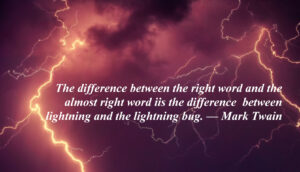What it takes to get into Public Relations
By Sue Voyles / May 25, 2021 / effective communications, leadership, public relations

One of my favorite insights in the world of writing.
Learning, deciding and networking. These describe what someone who wants to get into public relations needs to focus on.
I will address each in detail later, but first I would summarize it this way: to work in PR or any communications or marketing role you usually start by following an appropriate education path. Next you will need to decide what you want to focus on – working for yourself, a PR agency, a role in corporate PR or nonprofit organizations. Last, and no matter what career path you decide upon, you will need to network, build relationships on your own, and continue to grow in experience and knowledge of PR.
So, let’s back up a bit, and talk about each of these areas more. We will do it through the lens of my own experience of founding and operating a PR firm for 22 years.
Getting started on your PR journey
For most, but not all PR professionals, the career journey will stem from an interest in communicating, writing, advertising or marketing. Depending on these pursuits the direction you take can lead along many fulfilling professional paths.
The path I took was based my childhood passion for writing and storytelling, which led me to obtain an education in English and journalism rom Madonna University and, later on, to growing my credentials through a master’s program at Michigan State University.
To jump a bit ahead, other educational opportunities through advanced PR certifications, for example, will be available throughout your career.
Going from PR education to practice
Once your college education is completed, which hopefully included an internship, the avenue that lies ahead involves the second aspect I mentioned – deciding. This can be a challenge, but will be assisted by your own interests and whether or not you can land a job that allows you to go from education to practice.
With diploma in hand, I was able to find work in the nonprofit world to practical skills and understanding. Don’t misunderstand, classroom instruction, especially from working professionals, is essential to gaining the kind of background knowledge you will need. Still, there’s nothing equal to field work. That’s why an internship or two can in invaluable.
Those years helping several different area organizations allowed me to build a network of contacts throughout the professional PR community. But more on that later.
Now that all sounds relatively easy, but keep in mind that the path to a PR career is as challenging as any other rewarding profession. The good news is that besides roles with PR agencies, many young PR pros can find work as I did in the nonprofit sector.
There are plenty of other opportunities outside of agencies – corporate PR is the obvious one, but there’s also government work. Just about every local city or township government has need for the skills of someone who is trained in public relations.
With the role of a PR professional focused on building and maintaining relationships with a wide array of possible “publics,” it’s easy to see why municipalities turn to them to help connect with their citizens.
So, the avenues are more wide ranging than at first glance.
After more than a decade working in PR, I began to think about running my own company, another pathway that many take successfully. So, in 1992 I pulled out my rolodex (there was no social media yet) and considered my chances.
My goal was to create a small, what some call boutique, PR company, working from a home office and, if successful, to grow the company while helping other small to medium size companies improve their PR and begin to help them tell their stories through my professional PR toolbox.
Growing your PR career
One thing I realized right away for my new business was the power of networking. I have always been a very people-focused person, and it was easy for me to expand my professional network and score some work through these contacts.
As Logos Communications grew, I added team members to assist with specialized tasks. Keep in mind that I have been using a remote, or virtual as I like to call it, team long before this health pandemic forced many operations into that mode.
Besides expanding relationships in business, I also connected with area journalists and media organizations, a key network for any good public relations professional.
So, to step back on how to get into public relations – recognize the value of relationships and connections. If you want to be a PR professional and are not sure you have the people skills – or understand how to connect – there are plenty of resources that can improve your networking skills.
For those who pursue the entrepreneurial path, this is one of the key ingredients to creating a successful business. You cannot sit in your office and wait for the phone to ring or an email to reach your inbox. You have to “get out there” and seek your professional destiny. For some, a corporate PR job may be a better path. But even with that your network of fellow staff members or media resources remains highly important.
In the end, recognize the power of relationships. You are going into an industry that counts on building links with people. Figure that part of your career path early on and make the most of your connections.
It’s something that remains critical to my company’s success to this day.

